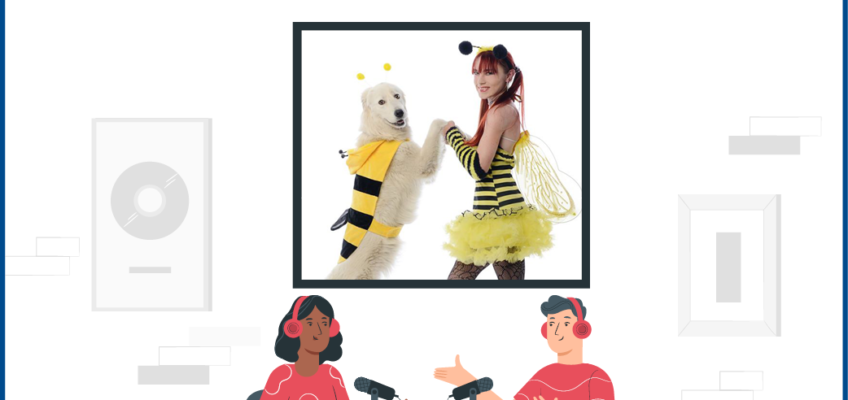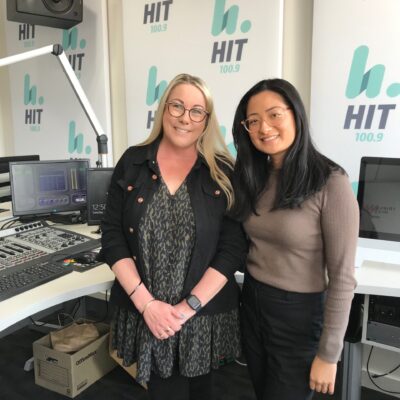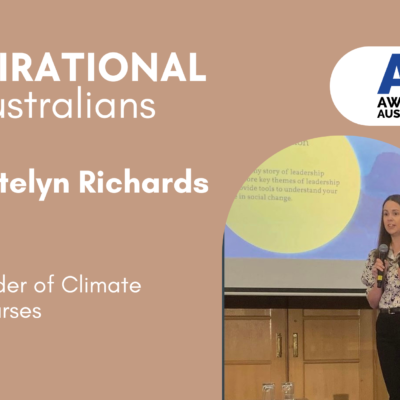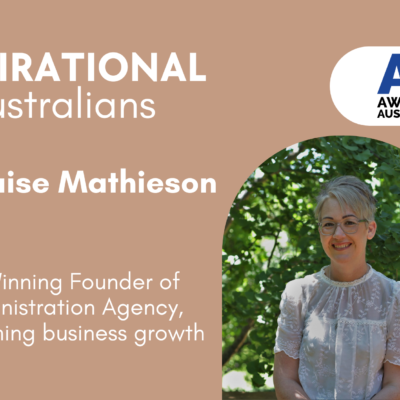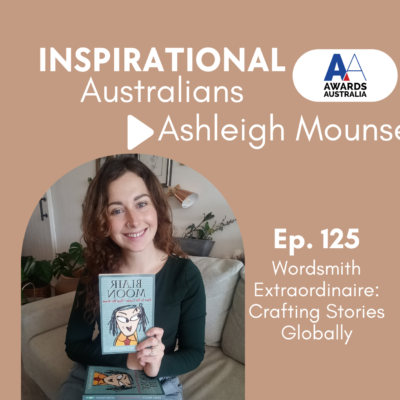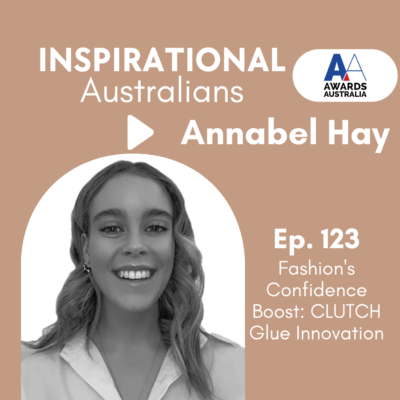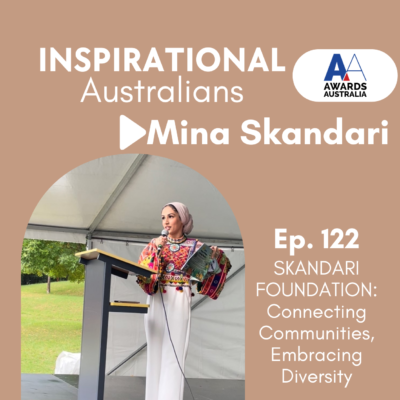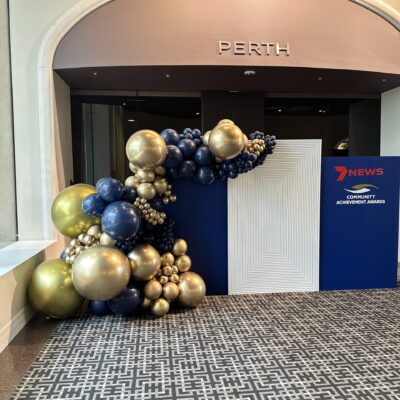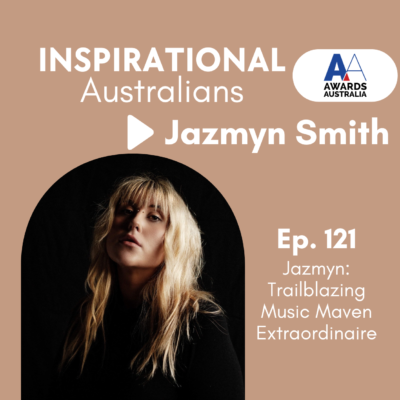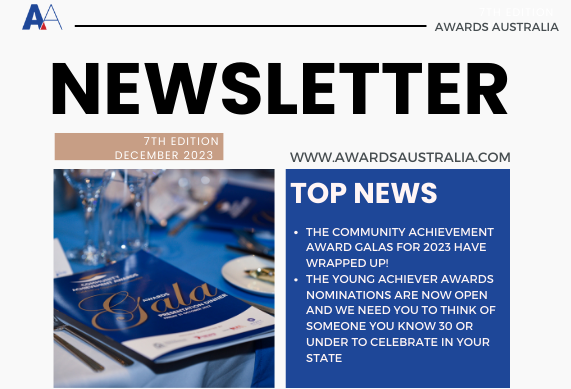In this week’s episode, Geoff is talking to Kit Prendergast who was a Finalist in the 2019 7NEWS Young Achiever Awards, Western Australia.
Kit Prendergast is a native bee scientist and conservation biologist, dedicated to promoting evidence-based actions to preserve indigenous native bees. She earned a Forrest Scholarship for her Ph.D. research documenting native bee biodiversity in the southwest Western Australian biodiversity hotspot. She created a Facebook group ‘Bees in the burbs’ which now has almost 8.5K members, and has conducted citizen science projects to engage the community to care about native bees and ensure that there are thriving bee communities. Kit was awarded the Flow Hive Pollinator Support Program, Graduate Women WA Mary Walters Bursary, Australian Wildlife Society University Student Grants Scheme and the Ecological Society of Australia’s Outstanding Outreach Prize, and was a FameLab Australia finalist. She’s been invited to speak at community events and has published several scholarly articles. Kit has also written the popular book ‘Creating a Haven for Native Bees.’ When she’s not out among the bees and flowers she is spending time with her dog, bunny and birds, or tumbling about doing acrobatics as a circus performer.
In this episode:
- Hear about Kit’s passion for educating everyone about native bees and ecological conservation
- How many animals does Kit look after at any one time? A lot!
- Kit reminds us that not all bee hotels are equal and we can be doing damage without the right information. See the link below for her book to get that info.
Links
- Connect with Kit at her Facebook group, Bees in the Burbs
- Connect with Kit on Twitter @BeeBabette
- For Creating a Haven for Native Bees book purchases, email kitprendergast21@gmail.com
Follow us on our Inspirational.Australians Instagram Page
Want to nominate someone? (It can take as little as 2 minutes to recognise someone making a difference)
Like some more information on Corporate Partnership?
Transcript
Annette (00:05):
Welcome to the inspirational Australians podcast, where we chat to people, making a difference in their communities and in the lives of others. And here is your host for today, Geoff Griffin.
Geoff (00:20):
Welcome to the inspirational Australians podcast, stories of inspiring achievements and community contribution. Every week we will celebrate an award program, category winner or finalist. We hope you’ll be inspired and encouraged to know that Australia is in good hands. Together with our corporate partners and not for profit partners, Awards Australia showcase ordinary people from right across Australia, doing extraordinary things. If you enjoy hearing the stories about inspirational Australians, please subscribe, rate us, and review us, we’d really appreciate it. Well, last year was one to forget for many, but also made us stop and think about what is really important to us. Family, friends, being kind and giving. And I hope 2021 will bring health, happiness, and hope to all of our listeners. And speaking of what’s important, I’m super excited to chat with this week’s podcast guest. Our guest is an extraordinary young biologist who won the 2019 Scott Prince Environment and Sustainability Award, part of the 7News Young Achiever Awards WA. Kit Prendergast is a native bee scientists and conservation biologists. And whilst I can’t confess to know much about the native bees science, I am fascinated to learn more and I hope you all are too. Kit, welcome to the podcast.
Kit:
Hi Geoff. It’s a pleasure to be chatting to you today about native bees and conservation.
Geoff:
Yeah. Looking forward to learning more. And I think it’s fair to say that you’ve packed in a whole lot into your life so far. What gave you such a buzz about native bees and why did you decide on a PhD and native bee diversity?
Kit:
Um, I get lots of bee puns, so I’m used to it. So, interestingly most people I feel when they do a PhD on a particular topic, it’s something that they’ve been passionate about their whole life, but until about five years ago, I didn’t even really know much at all about native bees. I think like the majority of people I knew there were honeybees, I knew there may be a couple of other bee species. And you they’ll Bumble bees overseas. Um, yeah, I didn’t really know much about native bees and, um, I was first introduced to native bees in Australia, I guess when I was in, I think it was my third year of undergrad at UWA and we had a lecture about alternative mating strategies and they talked about, and the Amegilla Dawsoni, which is one of our largest bees in Australia and it lives in Canavin and they had this really cool mating strategy where there’s like big nails and they fight for mating rights. And then they got small naked males who weighed at the flowers for the females. So that was sort of my first introduction to native bees. And maybe, I guess it was sort of bringing it the back of my mind. Like there’s more bees than honey bees, but I’ve been like fascinated about biodiversity as a whole and nature, unlike a huge nature lover. And I love animals heaps and like super passionate about the environment and conserving nature. And so, um, I did a, um, I did two degrees on zoology and conservation biology as well as English and cultural studies. And I did my honors on horses because I love horses. So I’ve always been like following my passions. And then I was thinking of PhD topics and I had all these ideas. I didn’t really want to do one. That was someone else’s project. I wanted to design my own things. I’m super like independent. Um, and I feel like if you’re going to spend, you know, four years of your life doing something, it needs to be something that like you can own and that you love. Um, and yeah, had all these ideas from marsupials, yours too long, that turtles and climate change. Um, and then I went to a talk by, um, FWA naturals club because I, I was like, as I said, I’m super, interested in like nature in general. And there was this old gentleman and he was showing photos of native bees using some bee hotels that he had made. And I was like, wow, these are so cool. And they’re so cute. And I went home and it obviously made a massive impression on me. And I started thinking like, you know, there’s so much research on bees in agricultural areas. How about in urban areas? Like urban areas are a rapidly expanding form of land use change. There’s also lots of remnant bushland within urban areas. People manage gardens, gardens could be good for bees and all these thoughts going through my head. And then I was like, honey bees, they’re introduced, um, you know, we know introduce species, um, have negative impacts on wildlife in Australia. How might they be in impacting native bees? I started reading everything I could, talking to like experts. And then I came up with this PhD idea and then of course I needed to get supervisors. And that was another like long story, long journey and getting funding. And then, yeah, it’s just, um, become now like a massive part of who I am in my life. That’s the long story.
Geoff (05:58):
That’s very cool though. I love it. Um, and can you tell me what we all know as you mentioned about European honey that provides honey, but also provides a nasty sting. If it gets on, if you get on its wrong side or you get way, what are the main differences to our native bees? What would you consider that? The key things for the average person like me that would just distinguish a native bee.
Kit (06:24):
Okay. So, well you’re right. Um, honeybees are a much more aggressive than our native bee. So I was just doing a survey two days ago. Um, and honeybee decided to sting me on the stomach, which was not fun. Um, fortunately I was out in the Bush, so no one could hear me swearing my head off. Um, but yeah, our native bees, um, the majority of them can sting. Um, but it’s only the female, so no male bees can sting cause they don’t have a stinger. Now, although the majority of native bees can sting, they weren’t, unless you like physically grabbed one, whereas honeybees, they will sting you if you come close to their hive or if they just don’t like your face, which seemed to be the case with the one that just got under my shirt and stung me. Um, so, um, yeah, the native bees also, when they, when they sting you, um, this thing stays intact. Whereas with honey bees, when they sting, you vesting, um, breaks off and so they die. So it’s like not good for you or for them, but, um, it’s an evolutionary strategy to defend the colony, which is their, their main thing, which is another thing with native bees and that most of them don’t live in colonies. So if you see a big like comb of bees or big colony, it will almost certainly be a European honeybee and their native bees, most of them are solitary. So they don’t live in, in social groups, um, native bees, they come in a whole range of sizes and whole range of colors. And um, some of them aren’t even ferry. Um, but yeah, not many of them are yellow and black,
Geoff (08:09):
But they mainly smaller than honeybee.
Kit (08:11):
Yeah. Most of them are smaller. Um, as I said, they, they can be as small as just over two millimeters to bigger than a honeybee about three centimeters. So Amegilla Dawsoni is one of the big, bigger ones, but yeah, I think the majority of them are small than honeybees, but yeah, there’s a huge, huge variation and there’s like, there’s 2000 species. So it’s, it’s sort of hard to say this is like a, this typifies a native bee, cause it’s just such an incredible diversity, which is what I love about the native bees is such a huge diversity. And you can answer to so many like ecological questions within that can be indicator species in particular habitats. And, um, you know, they’re, they’re sort of like kicking, he plays in ecosystems.
Geoff (09:00):
Very fascinating. What’s the main purpose of bees?
Kit (09:06):
Good. That’s an interesting question. And I, when, when I hear questions about purpose, I, I think it’s, you can’t really ask what’s the purpose of a species cause it’s quite teleological. So species that obviously weren’t created or designed. And so they don’t really have a purpose. Like no humans don’t even have a purpose. We make our own purposes. But if you can say like, what sort of role do they play in ecosystems? Well that, again, that varies a lot with the native bee tactics. So we’ve got some that are specialized on particular flowers and so they can be very important in the pollination of those flowers. Some are really, even if they’re not specialized, they’re very good pollinators due to their behavior or their body size or where they carry the pollen. Then we’ve got some bees that, um, actually not very good pollinators. Um, but I, I think they’re really important in terms of just showing the diversity of different life history strategies. Um, we’ve even got bees that are clipped to a parasitic, which means they, their common name is cuckoo bees. So like cuckoo birds, they don’t forward for food for their offspring on and don’t make their own nest, but they lay their eggs in the nest of a host bee and then the baby bees hatch out and eat the provisions and the larvae of the host. So they, they learnt really because of their forage for the, um, their offspring, they’re probably not good pollinators. And you know, they can have negative impacts on the host, but due to, you know, evolution, they wouldn’t ever cause the extinction of their host. Cause it would mean the extinction of them. So there’s this balance. So that’s the sort of ecological roles that they have, but I wouldn’t really say that any have a purpose per se.
Geoff (11:04):
Our listeners are already studying together, uh, feel, feel passion for native bees and cause biology in general, which is so important to us as a race, but as Australians to understand the value of our native bees, but also native creatures, flora and fauna. You created a Facebook group bees in the burbs. Is that still going and what were you aiming to achieve with the members in the group?
Kit (11:36):
Yeah, so not long after I started my PhD, I became very, very aware of how unaware people were about native bee. There’s still lots of people today that think that honeybees are Australian bees and that’s, that’s all the bees there are. And um, even people that are aware of native bees, there’s not much information available, especially when I first started my PhD on like evidence-based ways to conserve them, um, how to get accurate ideas, why group, I call it a bit because at first it was quite local. It was, there were native bees, but also, um, I needed, um, people to, um, offer, to survey their gardens as part of my PhD. It’s 2021 now, so yeah, four and a half years or so that has been, um, since I created this group, there’s now I think 8,800 members or something like that. Um, maybe a bit more by now. Um, so it’s clearly like, you know, blossomed and it’s now called bees in the burbs because it’s Australia-wide, and there’s even international members. Um, and, um, it’s not just in the burbs, but, um, I did a poll about a week ago about changing the name, but people loved the, the alliteration of bees in the burbs. So it stayed bees in the burbs, even though it’s not just the burbs now they’re staying short for suburbs. Yeah. I’ve now got citizen science projects there, um, to look at, um, bee hotel use, um, um, also when and where people see bees in West Australia sort of like an ongoing long-term monitoring project. And I share information and ID, um, photos of bees for people, um, you know, at least 10 posts I think about every day. So it’s very active and I spend a lot of time on it.
Geoff (13:42):
In addition to the 7News Young Achiever Awards, you’ve received numerous other awards too, including Flow Hive Pollinator Support Program, Graduate Women WA Mary Walters Bursary, Australian Wildlife Society University Student Grants Scheme and the Ecological Society of Australia’s Outstanding Outreach Prize, and was a FameLab Australia finalist. Can you tell us about some of these awards, what they were for and what you’re able to achieve as a result of winning the awards?
Kit (14:10):
Yeah, so the, the pollinator support one was a really interesting one. So, Flow Hive, they’re a company that, um, makes hives for honey honeybees. And, um, they’ve got a like special honey extraction method and it’s really, um, I guess opened up bee keeping for people cause it’s a lot easier to extract the honey. And I’ve got an interesting relationship with bee keepers, as you could say, because the honey bees are an introduced species and I have been researching the impact of this introduced species on native bees because the honey bee industry as an industry is very important to Australia for honey. Cause most of our native bees don’t make honey and of the 11 that do it suddenly small amounts. And there’s none of those in Southwest Western Australia and honeybees also super generalists they’re introduced species so they can visit, um, you know, exotic crops and they’re very abundantly can be managed. So from an industry perspective, they’re very important. But then for, um, Australian flora and fauna, not so much, especially not if they go feral. So it’s about, um, managing the industry as a sustainable industry, I guess like any sort of agricultural industry and realizing that keeping honeybees isn’t saving bees because, um, it’s, it’s like saying that keeping chickens and saving wild birds, that’s exactly the sort of comparison, but, um, they were, they were Flow Hive is really good in that they recognize that. Yeah, there’s like, there’s a difference between honey bees and native bees and they wanted to give back to the broader community. Um, and they, for some projects and, you know, we’ll shortlist 12 and this is a global thing, like 12 across the world. And then of these, these 12, we are going to get the community to vote for the ones that they want. Um, so mine was shortlisted and my project was DNA bar coding bees. And so in Australia, um, it is amazing how bad the bee taxonomy is, um, for a developed country. Um, our like the taxonomy of our bee is actually very poorly known, there are so many species that are undescribed or they they’re not put in like a phylogenetic sense. So we don’t know how they’re related. Um, or they were described so long ago, that’s the description. Like there’s no images. You just have to try and figure out like what a paragraph is like there, the way that we described bees has evolved and improved a lot over like the last century. There’s, there’s a lot of work to do on bee taxonomy. And one way that we can help with this, this issue of bee taxonomy is DNA bar coding. So all species are related through DNA, cause we’ve all through from a common ancestor. Um, and when a species evolves into two and diverges, they, um, ended up being independent lineages and they accumulate genetic differences. And so if we like DNA barcode them, we can see like what species are different. And if there’s like a specimen that has a unique barcode, we know that’s a new species or different species. Um, so it’s this really, um, exciting genetic tool that we can use to compliment the morphology. That’s what this, this project was, was, um, using, um, DNA barcoding to help with the taxonomy of native base. That was the project so that, um, I got a grant for that and that’s been great and their bees had been barcoded. Most of them have been, but we’re still writing for results for some, because you know, with COVID, um, the, the barcoding centers is in Canada. And so there’s been all these delays, unfortunately. Um, but, uh, we’ve already had some, like, you know, some of the bees have been barcode and there’s been some exciting results, including like confirming, um, males and females because they look very different. And so unless you actually see them mating or see them emerge from a nest, you don’t know whether, like if you catch a male and female of an undercroft species, that they’re actually the same species. So it’s been really exciting to associate, um, males and females. And so there has been some progress there already. Um, and then with like Fame Lab, that was, um, a really great experience because it is the science, but there’s also science communication and communicating science I think is now more than ever so important, um, in an age where there’s endless information, but not all of it is accurate. Um, and there’s so much pseudoscience and so much, um, you know, conspiracy theories and, and, um, you know, it has a very negative impact on the world. So, we really need to communicate science, effectively engage more people in science. So, Fame Lab is a competition for, um, scientists to describe their research in three minutes. And, um, you know, trying to distill years of your life, the intricacies of, um, of your science to three minutes is actually very, very challenging and doing it in a way that really engages the public in a fun way and so that’s what Fam Lab was. And my finalist speech was about honeybee and native bee competition. And then, um, the semifinalists, I, um, did different speech on, um, the importance of, um, bushland remnants versus residential gardens for bee conservation. So they would to sort of like, um, separate strands of, of my PhD and, um, yeah, the, the finals was really a great experience cause we had a pre COVID. We had a baby C presenter, um, Dallas Campbell over from the UK to give us, um, two days of coaching, um, uh, really great to, um, I guess engage such a broad audience and any element like I love performing. Um, I’m currently, um, rehearsing for fringe festival, which is a festival like, um, arts and, and circus. And I’m in the second performer and there’s something about getting up on stage in front of an audience that’s really, really exhilarating and yet doing it, um, communicating your science in that sort of atmosphere, um, is that the Heath Ledger to theater, like, you know, on this grand stage, it was really, um, really exciting.
Geoff (20:59):
Absolutely. You pack so much as I said earlier into your short life already, I’m a bit embarrassed about what I’ve done with mine, your knowledge is supreme and to have been involved in all those things that you just talked about would have been extraordinary experiences and to pack your life into three minutes, I guess, is like an elevator pitch for, for a salesperson that, um, very important, I think, to be able to do that in terms of it being able to educate, pick one and short period of time. So I think that would have been really valuable for you, how was, uh, being nominated for, and then also for of course, winning the 7News Young Achiever Awards, how did that help you in terms of your promotion of what you do to them for native bees communities did it help at all?
Kit (21:52):
Um, I think so like, especially in this sort of like the broader, um, WA community, because before that, I think I was at a stage where lots of the, sort of the bee people knew who I was, but, um, sort of engaging with people that wouldn’t normally be interested in, in bees and like that sort of extra reach of, of people that wouldn’t really think about the environment per se. Um, so it was yeah, really, really valuable, I think in, um, raising awareness of that, about native bees with like probably the people that need to be aware about it the most, because otherwise you’re sort of like already, it’s called like you’re preaching to the choir or sort of like talking to people who already share those interests and values, but, you know, drawing in those, those extra people and raising the profile of native bees in like such a prestigious events. Um, yeah, I think it was, it was definitely there.
Geoff (22:57):
Yeah. Preaching to the converted and converting more, I think is so important. I had probably can do that to through this podcast as well. It’s such an important topic and issue for us all. So make sure you get onto Facebook and like bees in the burbs, but also, and we’ll talk a bit later about how people can follow you and learn more about connect with you, Kit because your work is so important and nominations are still open in some States for the current seven news young achiever would program for 2020-2021. So would you encourage our listeners to nominate someone they know? And why would you,
Kit (23:39):
Well, I think, you know, there’s so many young people doing so much for the environment per se, but we do it because we love it. We have a passion. We want to make a difference to the world. And, you know, recognizing these individuals I think is like really, really wonderful and nourished by casing their research to the broader community.
Geoff (24:03):
People don’t look for accolades, you know, young people get out there as you said that one of my key difference, they want to make change. They don’t do it for acknowledgement part. We all appreciate getting a pat on the back and beyond that it can further promote the work young people are doing. And in your case further expose the value and importance of what you’re doing with native bee communities and so on. So super important for young people to be promoted for what they’re doing in the community and how others can value the value add or benefit is super important as well. So for any of our listeners who would be interested in nominating someone, they can go to awards australia.com find the young achievers States that is relevant to them. Of course, podcast goes across Australia. So anybody can nominate it cause so important that our young people are acknowledged people like you, Kit and making such a difference in the community. And that’s a real driving passion for me and has been for over 30 years to be able to acknowledge people doing extraordinary things. And that has driven me for all this time to continue this program and to continue to make a difference, even during COVID times when we had to do all our, all of our programs online last year, it was rather different. But so unfortunately we didn’t get to meet people in the flesh, but it was still really important to acknowledge people in that way. So you’ve published a lot of articles and you’ve written a book, which I think is really cool and important, Creating a Haven for Native Bees. Annette, our producer was talking about this to me earlier. Tell us more about, uh, what purpose of their articles, but most importantly, can you tell us about your book?
Kit (25:56):
Yeah, so, um, I’ve written lots of articles, um, for various magazines, as well as scientific articles. I finished off 2020 with, um, a bit of a high, which was, which was good for an otherwise not great year in that cause, which was a chapter of my PhD thesis, except in, in addition to, you know, the, the scientific articles. Um, I wrote a book, um, a couple of years ago and it started off, um, called, um, Bee Hottls for Native Bees because, um, bee hotels are something that can be really good or they can be really bad. Um, they’re essentially structures that, um, you can use to create extra nesting habitat for cavity nesting bees. And I was using them for my PhD studies to study nesting behaviors of native bees. And I published a couple of like scientific articles on some really neat observations, like including the first records of a bee that collects banksia fuzz. So, like banksia cones, when their flowers drop off, they, you get this brown fur and it was collecting it and putting it in its nest. And it was like the only bee that does this. And it was like a really interesting observation, but bee hotels are also great for making observations of native bees. I’m providing them with extra nesting habitat, especially in areas where trees have been cleared because that’s what they, they nest in, in nature trees with little tiny holes in them. Now, unfortunately there’s lots of companies that have seen that bee hotels are popular and they haven’t consulted with people that work on native days at all. And it just created these structures that look nice, but don’t do their purpose. And so, I wrote a book on how to actually make bee hotels and about the bees that use them, cause people putting up in like no bees entering them or like, will, will the bees bring me honey. So, it’s clearly like they, there’s this lack of knowledge about what these structures are for and how they should work. And so I wrote that book and then I, I realized there was more gaps in understanding in terms of what flowers to plant for native bees. So part of my research, I spent hours and hours recording all the flowers at my sites and all the flowers at the bees visited and didn’t visit. So I had a really good idea about what were the best flowers for our native bees. And if you just Google flowers for bees, you get ones for honey bees mainly, and then exotic flowers. And like there’s scientific reviews have shown exotic flowers, uh, contributing to, to bee and insect declines and, you know, various other like negative impacts. I wrote this book and then I really titled it creating Have for Native Bees with additional information about other methods that we can all do to help native bees. Cause recognizing that, especially nowadays, not everyone has a garden and not everyone has the money and the time to look after gone, like, you know, especially people that are sort of in my age bracket, like lots of them live in apartments and they don’t have a garden, but they still want to help bees. So, there’s other things that we can all do, like the most important things to protect, protecting native vegetation, reducing our impact on climate change, like going plant-based with our diet. Yeah. This book is about, you know, evidence-based ways that we can all make a difference, but especially like the bee hotels and the flowers for Australia native bays. So that’s the book and, and yeah, it’s, um, it’s been really popular. I recently sold out of the hard copies, but I still have an online, e-copy and I’ll probably be printing off another batch, maybe a in a couple of months, time I might like update it. I’m hoping. So my, my thesis, I submitted my PhD thesis in August and it’s still under examination. So, I sort of want to wait until it’s examined and I get my doctorate. So, you can say, by Dr. Kit. So that’s, that’s sort of the why I’m waiting to print off another batch.
Geoff (30:00):
Yeah, I think that’s probably a good move. And I know, and that Annette got one of your books on order, so she’ll be pleased to hear that the next batch is coming up for hopefully not too far down the track. She is very much looking forward to, to getting your book, but there people can get online. You mentioned a copy online.
Kit (30:21):
There’s an online copy. So it’s an ebook and that’s probably, you know, in terms of, um, it’s, it’s cheaper, but also, you know, um, reducing paper, um, postage costs. So it’s, it’s a good option as well, in terms of thinking about climate change, um, postage, airplane travel, you know, if it’s just online, then you cut those.
Geoff (30:45):
But it’s immediate too. They just said the white side. I think that sounds like it makes good sense. How can people get the book?
Kit (30:57):
Um, they can get by emailing me. Um, my email address is kitprendergast21@gmail.com, but there’s also a Facebook page and you can message me through there as well. And that on that page has the book title on it. So you can see what the book title looks like. And, um, yeah, like as I said, bee hotels, they, they definitely do work if you make them. Well, just yesterday I spent like 15 minutes photographing a little Megachille from one of my bee hotels. I just posted the photos in bees in the burbs today. And it’s this gorgeous day. It’s not this like flaying colored fairy head. And it’s got red eyes like bright red eyes. So really, really cool bee.
Geoff (31:47):
Get onto the Facebook page. As we’ve said a few times now, seriously, people, we got to get to do this so important. Get the book, creating a home for 90 days online, ASAP, just a question, another naive question. How important is it for us as the average person in the burbs to do our bit, to create opportunities for native bees to flourish, whether it be in the hotel or the appropriate one, we click them learn I’m sure from the book or just planting our right flowers, we all think our bee will be, it won’t be enough. So, but how important is it?
Kit (32:32):
Oh, that’s really important because bees are in the burbs. And that’s like, when I, when set out to do my Phd study, cause it was like new ground and they said it was a project. I designed myself, I had no idea. I was like, geez, like what happens if I go to people’s gardens? And I spent three hours there every single month, over spring and summer for two years. And I’m just sitting there, like not, not saying anything like, you know, I can definitely think of worse things to do than sit in the garden, but in terms of like study or results, then it would be a bit disappointing, but there are days all around the burbs. And I know not just in Western Australia, even though Western Australia does have like heaps of native bees and in the other cities, um, then there’s bees. And so they’re there and that’s the opportunity for us. And, you know, there’s lots of variation among gardens and how good that alpha native bees, let’s make our cities not sort of like homogenous cities that you could be in any city in the world, but like keep that flavor of Australia in our cities, in our gardens with the native flowers and native bees are there. And if we do that, then our native bees can continue to, to flourish. And, you know, there’s, there’s benefits to ask as an ale, pollinate, the flowers in our gardens can have native bees visit your garden and your garden can be like a home for them. Um, and your kids keep the native vegetation around. And, um, rather than have sort of like me, I guess dream is rather than have like cities with bits of their vegetation. And then all of these exotic gardens have it more like the, the city is sort of like the patches within the bushland rather than the bushland is the patches within the city. They’re like green the cities so that they, they become habitat. And where sort of like making a habitat in, in the bushland that, that is the city.
Geoff (34:35):
Yeah. I think it’s a good goal for all of us. Absolutely. Kit, I’ve mentioned that of several thousand times already, but what drives you to keep doing what you do?
Kit (34:48):
I’m just like a naturally I think really passionate person I’m really determined. And I just, I love, uh, love nature and I love biology and yeah, like my whole life, I, you know, I’d rather watch David Attenborough documentaries when I was six rather than watch. Um, I don’t know, like cartoons or something. And, you know, I, I used to just read fact sheets on a species and, you know, in my spare time read like science articles and I, I’m just always like fascinated about how nature works and evolution and biology and ecology. So I guess that’s, that’s part of it. And just being out in nature, there’s something so, so beautiful about going out in the Bush and being like part of like that, that wilderness, it feels like you’re as an Australian, like feels like you’re, you’re exploring and that’s where you’re, you’re meant to be. And just the sights and the smells that it’s. Yeah, it’s really beautiful. And it’s, it’s so sad. I think for, for people like you in, in Victoria that, you know, when you’re in locked down, um, you’re stuck in, you know, your home and you can’t really go out and experience nature as much as you used to do. Hopefully, um, you know, Covid will be gone soon and then people can go out in an inexperienced nature and in Western Australia feel like, because the border closures and there’s been this like push it’s called like wander at yonder, like about like experiencing the country and the landscape and the wildlife and that’s what makes places special. Um, so yeah, I guess that’s, that’s my passion, my just like love of nature and the environment and wanting to do something like meaningful with my life I suppose. Yeah.
Geoff (36:49):
Well, you’re certainly doing that. Absolutely. And I do hope that you’ll be able to take lots and lots of people on that same journey with you because it is valuable. It is important. And we have a lot to be proud of in Australia and Australia is very multicultural. And, uh, in terms of what is fixed about Australia is it is our flora and fauna that we can all be proud of. And we need to do that a bit to ensure that stays strong and available to us in urban areas, as well as regional rural communities. How do you stay motivated? You know, you’re so passionate, you’re doing so much, have you stay motivated to, if you’re feeling wary? Well, things not going according to plan, you know, you’re so passionate about native bees and biology, and when you see others not maybe doing the deed but actually degrading those things that we should hold, dear, how do you get out of ruts or saying you do, but how, how do you stay in that regard?
Kit (37:58):
Yeah. So it can be like really depressing. I guess part of it is like shutting off from the negative social media. And also the great thing about like being a page in of scientists and stuff is you get to sort of be in your bubble of like-minded people and then you go out into the world and you’re like, Oh, there are some brilliant people out there, like lots of brilliant people doing the right thing. Um, and yeah, so part of it, I guess, is just like, yeah, my love of nature. And, and I’ll just go in, like, if I’m feeling sad or low, I go for a walk and I have like, I have pets and pets like such a big part of my life. And it’s so beautiful because they never judge you and they just like connect with you on a different level. So, my dog, um, she’s very dear to me and my birds. And I currently like hand raising a baby, Laurie, Kate, um, and that was like, it was found and it was falling out of the nest or something. And so I had to like hand feed it every couple of hours, but it’s like, so rewarding getting in touch with nature is definitely like my motivational thing.
Geoff (39:11):
Well, it’s not a bad thing to be passionate about doing what you’re doing, keep them going to, you know, to do more and more that don’t burn out. And I think what you said, I have a dear friend, Christina chia, she balances, she’s such an amazing person, a volunteer. She, she connects with nature at every opportunity, whether it’d be walking, she’s always so appreciative of everything around a particularly native Australia. She loves it, she connects with it and that helps ground her and only takes a lot from that. And it really is what you’re saying to connecting and understanding nature and what it does for us and how it gives to us and how we need to in return back to nature and being more conscious of what we do and how we do it and how that impacts. What’s something just changing tact, a little, what’s something we might not know about you?
Kit (40:10):
For people that know me know that like for, for listeners that don’t, um, yeah, I guess I don’t conform to like the stereotypical image of a scientists. I think that’s really important for especially younger people. When I think, especially with entomologists, right. As, um, I guess the stereotypical image of an entomologist is like an old spectacle man and a cardigan. Um, not that I have anything against old spectacle men in cardigans where entomologists or people that fulfill that, that image as a whole. But yeah, so, you know, I’m a circus performer. I, I always like dress how I want. Um, and it’s usually like leggings that are colorful. Um, and then like a t-shirt or that has like designs with bees or whatever on them. Like, it’s funny because there’s so many times that people, like, when they see me, they’re like, Oh, I didn’t expect you to look like that. I even did some research in Tasmania. And I, I came to one of my study sites. I was studying, um, bee visitors to, um, Apple trees that sort of the pollinator visitors. And, um, I got out and the lady was like, ah, and like she knew that I was coming to survey her orchard for bees. And she was like, Oh, are you one of the backpack is looking for work. And I was like, no, I’m actually the scientist that’s coming to study the bees. And she’s like, Oh, I do realize you going to look like that. And I was wearing like a, you know, like a bright jacket. Yeah. Like things, as I said, like the leggings are sort of comfortable and practical.
Geoff (41:56):
That looks good. That look was great. Well, it says something about the person, two things, a good thing. I’ve seen a photo of you, of course, wearing a very bright bee outfit leggings. I loved it. And your beautiful dog that you had read to you. The other thing is you mentioned a little bit earlier, just a moment ago that you’re an acrobatic circus performer. I find that quite fascinating. Can you tell us a bit more about that? How did that come about where do you perform?
Kit (42:31):
Yeah. So when I was younger, I did gymnastics and I loved it. Um, I’m, I’m a small build and that works well, and I have good flexibility. And then, um, my parents, they thought it was a children’s sport. And they’re like, you know, when you’re young, like he can’t pay for lessons. Cause I didn’t have a job. I didn’t have money. And they’re like, no, it’s the children’s sport. He too old for it. So I had to stop. Um, and that, that made me go sad, I guess. Um, a couple of years ago I was like, Hey, I’m in adult in terms of age, at least, um, maybe not maturity. Um, but, um, I’m an adult. I can do what I want. Now I’ve got a car, I’ve got money. So I went and found an adult gymnastics place and it was always the highlight of my week. And I think as the adults and so important to be able to play and, you know, keep the active, like keeping active is so important for your mental health and wellbeing and circus. Um, one of my best friends is a circus performer. Um, so that’s her, her job. And, um, she, she also studied mental health and part of the part of her research was just how important, you know, circus is, part of circus is what’s also important is, you know, in society was sort of told to, I guess, conform, but the circuses about like recognizing those things that make you different and that make you a bit weird and, and then embellishing on them and, and emphasizing them. And yet it’s about playing and connecting with people and becoming aware of your body and your boundaries and pushing those boundaries as well. So, um, I think circus is also been really important part for me in gymnastics. Um, certainly keeping active in keeping me motivated and keeping going. Um, and then my friend, she just last year, she created, um, a trip called Neuro circus. So it’s about, you know, circus, but also that, that nuero aspect. And she invited me to, because she knew that I still have those gymnastics skills, um, to be part of it. And it has been such a wonderful experience and, and getting to perform. And, um, we’ve got Fringe Festival coming out, which is, um, Fringe Festival has, uh, across the world. I think that it’s, um, you know, celebration of the arts, especially circus, but also comedy. And it’s also being, it’s called Fringe because it’s things that are a bit on the fringe, a bit different, a bit unique. And it’s a, it’s a great celebration of that. And so we’ve got a performance coming up and our performance is called eighties mixed tapes. So we’re doing acrobatics and circus to let’s get physical by Olivia Newton John. So, uh, I I’m so sick of that song by now. Um, but yeah, that’s, that’s my circus. Um, so I’m relatively new to it. Um, that it’s, it was really good because we started training just after I submitted my PhD and submitting my PhD. It was actually very, very scary because not only was it, you know, submitting it out for examination and like the fear of, you know, how will it, how the examiners, you know, value my, my life essentially. But also it’s like a loss of identity because the PhD becomes so much of your life and then you submitted it and then you’re like, great. So now I don’t have a job. I don’t have any money and I don’t even have my identity. Um, and sorry to go into having that extra sort of circus identity. It was really, really useful.
Geoff:
So, do you have any word of wisdom or encouragement for our listeners?
Kit (46:31):
Um, yeah, so everyone can make a difference. And I think that’s part of the great thing about native bees is that, or even biodiversity in general, because as I mentioned earlier, simply, you know, going plant plant-based in your diet, you can cut your carbon footprint by 50%, which is massive. And so there’s a lot of, a lot of scary things in the world happening at the moment. And people feeling like, especially if they’re in lockdown, that they can’t really do that much, um, in terms of what they used to be able to do in terms of helping out the environment. But yeah, we can all make a difference, but also my elder would have advised us to follow your passions. Like it will be so rewarding. I can’t imagine doing something that I would hate and, you know, doing what I do. They’re all like negative aspects, like ticks, for example, I hate ticks, balanced flurry, much happier, and just doing something that you love and keep active, go out in nature. It makes a huge difference to your overall mental and physical wellbeing. So those are my thoughts.
Geoff (47:45):
Fantastic. You talked about your PhD. Hopefully it will be coming to the conclusion once it’s been fully evaluated and hopefully that’s very soon. Finally, what’s next for Kit then? I know you talked about now. It’s a bit scary. What’s what could come next, but what would you like to be next or what do you see as being next?
Kit (48:04):
So, I would, I would love to get a post doc looking at the effect of fire on bee, um, wildfires, as well as prescribed fires. I’ve put in some grants. Um, two of them weren’t successful I’m writing back on another one. Um, there’s just like, yeah, not much money going around. Um, so ideally I would love a post-doc and at the moment I’m doing some surveys for DBCA in some nature reserves and for some the local councils in bushland reserves around Perth, which is absolutely lovely. That’s a sort of goals, you know, continuing to do research on how we can conserve native bees. Um, cause there’s, there’s just so much, so much out there that we don’t know and discovering where bees, what, you know, what their nesting biology is. Um, there, the taxonomy, as I mentioned is it’s really poorly known in Australia. So working on that, um, there’s, there’s a lot of work to be done. It’s just getting, getting funding, I think, as is always the case for a lot of environmental science.
Geoff (49:14):
Yeah. Well, I wish you, well, where can listeners connect with you online to find out more about you and your bees? And of course, I know your book that people can, can purchase online and connect with you on Facebook. What other ways can people connect and follow and discuss how they can make a difference with you?
Kit (49:37):
So I do have Twitter and my Twitter handle is Beebabette.so B-e-e-b-a-b-e-tt-e. And um, then I’ve got a research gate, research gate Kit Prendergast and that’s got, um, where I upload my publications. And, um, if any of them like kind of access them, then just email me and I’ll be, I’m always happy. And, um, PDF copies of any of my scientific articles.
Geoff (50:12):
Well, I certainly encourage people to buy their books, to get onto the Facebook group. Bees in the burbs as well which I’ll be doing. Annette, if she’s not already now, our producer will be doing. Is there anything else you’d like to add in closing Kit?
Kit:
Well, just to save the bees.
Geoff:
Well, that’s a pretty important thing for all of us to understand. I hope we’ve all appreciated that a little more importance about native bees talking to you today, Kit. Um, I hope everybody’s all enjoyed learning about Kit and Australia’s native bees and how important they are to us and to of course, really our flora and then impacts our forerunner as well. So, Kit it’s been a real pleasure to chat with you today. I hope everybody’s did and keep inspiring. Thanks Kit!
Kit (51:13):
Thank you!
Geoff:
Well, you take care. It’s been a real privilege to chat to you and I wish you, every success keep us posted and what you’re up to.
I hope you enjoyed today’s interview as much as I have. We would love you to subscribe to our podcast so that you won’t miss an episode. Join us each week, as we talk with ordinary Australians achieving extraordinary things. Did you know that Awards Australia is a family owned business that proudly makes a difference in the lives of those that make a difference for others. And we thank our corporate and not for profit partners for making our awards programs possible. Do you know someone that’s making a difference or maybe your business might like to sponsor an award, contact us through our Instagram page, inspirational.australians or head to our website awardsaustralia.com. It would be great if you could share this episode with your network because who doesn’t like a good news story and please rate and review us. We would really love to hear your thoughts until next week, stay safe and remember, together we make a difference.
Annette (52:25):
Thanks for joining us today on the inspirational Australians podcast, we hope you enjoyed listening and have been inspired by ordinary Australians, achieving extraordinary things. So, it’s goodbye for another week. Remember, together we make a difference.


